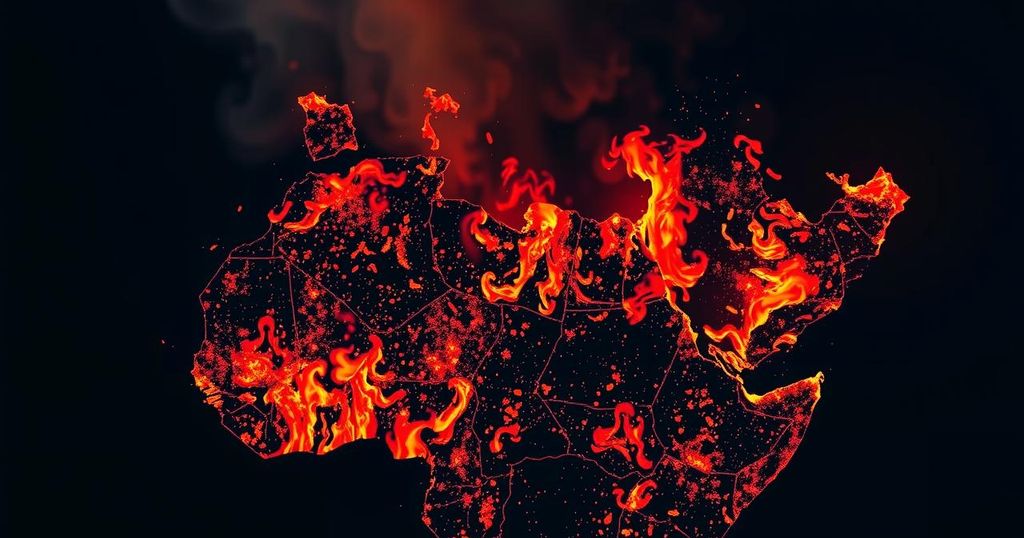World news
AFRICA, AP, AP FOTO, CARLOS U, CARLOS UQUEIO, DANIEL CHAPO, DEMOCRACY, DURANTE LAS, ELEC, EN MAPUTO, FR, HUMAN RIGHTS, JOHANNESBURG, LA CAPITAL DE MOZAMBIQUE, LEBOMBO, LLAMAS, MAPUTO, MOZAMBIQUE, POLITICS, SOUTH AFRICA, SOUTHERN AFRICA, SOUTHERN AFRICAN DEVELOPMENT COMMUNITY, UNA, VE, VENANCIO MONDLANE, VIOLENCE
Michael Grant
0 Comments
Post-Election Violence in Mozambique: Implications for Southern Africa’s Stability
Protests in Mozambique erupted following disputed elections on October 9, 2024, resulting in over 30 deaths and raising concerns about political stability. The ruling Frelimo party’s extended rule has led to calls for nationwide demonstrations by opposition candidate Venancio Mondlane. The unrest poses risks to regional stability, particularly impacting trade connections with neighboring countries. Recent electoral irregularities highlight ongoing governance issues in the region that underscore the need for urgent attention.
In early November 2024, protests erupted in Mozambique following widely disputed elections held on October 9, during which the ruling Frelimo party extended its 49-year rule. The protests, marked by violent clashes with police, resulted in over 30 reported fatalities and raised concerns about political stability. Venancio Mondlane, an independent candidate who secured 20% of the vote, has been vocal in challenging the election results, calling for widespread demonstrations against the ruling party’s perceived unfair practices. The unrest and its implications are of significant concern for the Southern African region, particularly as several countries have recently conducted smooth and credible elections, such as South Africa and Botswana. The effect of Mozambique’s instability is amplified by its geographical connections with neighboring nations, which rely on trade routes through the country. South Africa has already closed its border with Mozambique, resulting in daily financial losses estimated at R10 million—disrupting the transportation of valuable mineral exports. Understanding the historical context is essential to grasp the potential repercussions of this unrest. Mozambique has grappled with the legacy of a brutal civil war and has experienced recurrent violent outbreaks, including recent Islamist insurgencies in the north. This recurrent instability poses risks not only domestically but also exacerbates regional challenges, including illegal migration and economic disruptions as populations seek safety and stability. The recent election irregularities, as noted by the European Union observer team, highlight ongoing issues regarding electoral integrity and governance in Mozambique, which undermine regional democratic advancements. Political analysts emphasize that the ongoing violence in Mozambique and its electoral disputes require urgent attention from regional organizations, particularly the Southern African Development Community (SADC), scheduled to address these issues at their upcoming summit. Therefore, addressing Mozambique’s post-election violence is crucial for ensuring both local security and broader regional stability in Southern Africa.
The backdrop of Mozambique’s recent electoral turmoil is crucial in understanding the implications of post-election violence within Southern Africa. Following the 2024 elections where the ruling Frelimo party faced allegations of vote rigging, widespread protests erupted, leading to deaths and injuries. This situation is particularly telling against the recent backdrop of successful electoral transitions in neighboring countries like South Africa and Botswana, positioning Mozambique as a potential outlier in a region striving for democratic integrity. Given Mozambique’s strategic location, any instability may inflict far-reaching economic and political consequences on its neighbors, which have already been dealing with their challenges, including migration and economic dependency on Mozambique for trade routes.
In conclusion, the post-election violence in Mozambique signifies a critical moment for both the nation and the Southern African region. With an ongoing history of electoral disputes and violent outbreaks, coupled with a complex past of civil strife, the ramifications of this unrest extend beyond Mozambique’s borders. Regional stability hinges on a proactive response to the challenges posed by electoral integrity and governance, as the Southern African Development Community must consider intervention strategies to cultivate peace and democratic viability. The ability of Mozambique to navigate these challenges will be pivotal not only for its citizens but also for the stability of its neighboring countries.
Original Source: apnews.com




Post Comment